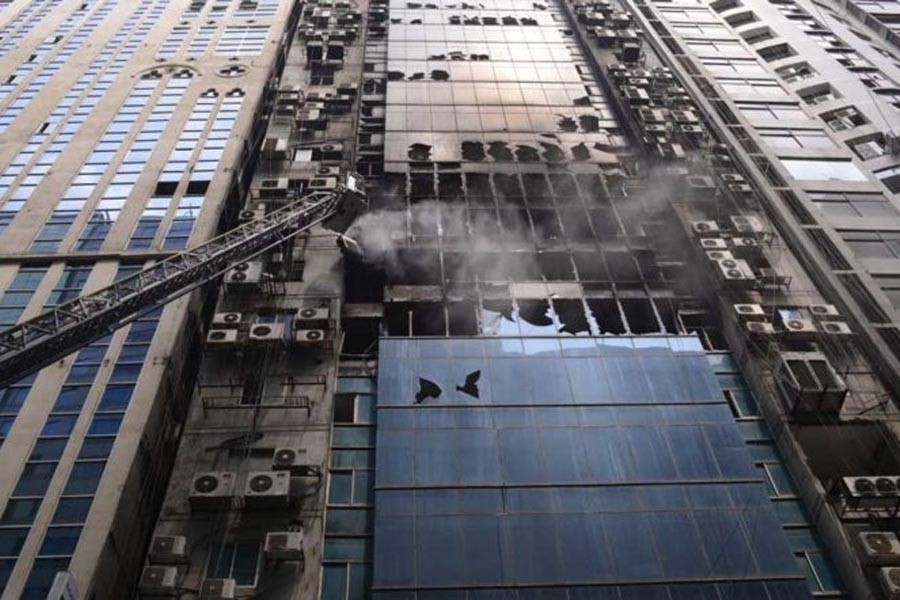As expected, the home ministry investigators have found electrical short circuit as the cause of FR Tower blaze that had claimed 27 lives and left more than 100 injured.
Fire fighters and probe bodies formed following major fire incidents, in most cases, blame power short circuit for the mishaps, raising doubts about proper investigation works. Many tend to liken the investigators' wholesale blaming of electrical short circuit for most fires to 'Kesto betai e chor' ( it's none but Kesto is the thief) type investigation result.
One, however, cannot rule out the power short circuit as the possible cause of fire in many cases. But when investigators fail to locate the real cause of fire, they do often tend to blame this potential factor as the cause.
Since the electrical short circuit remains one of the major sources of fire, big or small, it is natural that the relevant authorities would put in place a few preventive measures against it. But none is aware of any such initiatives until now.
If not for small residential and commercial buildings, the high-rise commercial and residential buildings that are now ruling the Dhaka's skyline must have their respective internal electricity power distribution network designs, drawn by qualified electrical engineers.
Owners of large and small structures in Dhaka and other urban centres are required to get their structural designs approved by designated government agencies. But it is not known whether they are required to submit any design concerning their power distribution network. When contacted, a Rajdhani Unnyan Kartipakkha (Rajuk) official said, the submission of any design relating to internal power distribution work with the structural plans is not necessary.
This should not have been the case. The city development authorities or some other public agencies in the power sector must be authorised to approve the electrical designs of at least in the case of high-rise buildings. In addition, there should be mandatory provision for periodic inspection of the internal electric lines and gadgets of all high-rise structures.
There is no denying that the requirement of electrical design approval would add to the hassles that the people face while getting their building plans approved by the Rajuk or relevant other official entities. But faulty electrical designs and lack of regular inspection of internal power distribution lines and circuit breakers pose a serious threat to safety and security of life and property. A fire caused by electrical short circuit might claim many innocent lives and cause substantial material damage.
It is rather clear that relevant government agencies have never bothered to look into this important safety issue.
If not any other agency, the Bangladesh Energy Regulatory Commission (BERC) should have taken up the issue and suggested necessary measures to address it.
The government after a long gap of 108 years updated the Electricity Act last year. But, it, deliberately or otherwise, skipped the vital issue of ensuring safety measures with regard to power distribution in residential, industrial and commercial structures.
The section 19 of the Electricity Act of 2018 empowers any person authorised under this law to enter a house or establishment to' examine power connection lines, fittings and electrical equipment'.
This provision does not say anything specific about making regular and periodic inspection of internal power lines maintenance. Nor does it make it mandatory for the owners of large or small structures to get their electrical lines examined by qualified electricians at least once a year.
The owners or various structures are found doing various types of maintenance works, but they hardly arrange any regular inspection of their internal power distribution lines or the gadgets such as circuit-breakers.
The government should without any further delay make it mandatory for anyone wanting to build high-rise structures to submit electrical design drawn by qualified electrical engineers. Such designs should accompany the structural designs, submitted to appropriate authorities for approval.
It should also made mandatory for the owner/s to arrange inspection of their internal electrical works by qualified electrical engineers, at least, once a year and submit certificates to this end to an appropriate authority.
There should be an entity like electrical safety board and it should be empowered to ensure power supply-related safety for the people.
To give legal coverage to the measures suggested above, the government should amend the Electricity Act of 2018.
In sum, the government can no more overlook a factor---electrical short circuit--- that is very often held responsible for major fire incidents. There should be some preventive mechanism in place against it.


